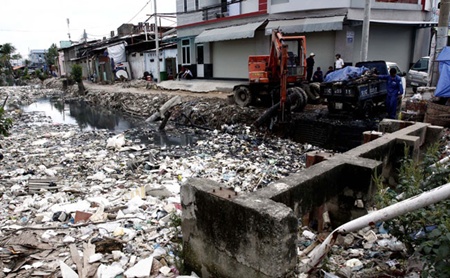Beijing, once among the most polluted cities globally, has significantly improved its air quality over the past two decades, with its experience possibly providing Hanoi with valuable insights into the severe air pollution that the Vietnamese capital is enduring.

The Real Barrier to Environmental Protection: Lessons from China
The Financial Times recently published an article entitled China: The road to reform. The first sentence reads: “For those who have to endure the toxic smog of northern China, it often comes as a surprise to learn that Chinese environmental laws and emissions regulations are some of the most stringent in the world.”
For those of us who live in Vietnam, these words sound familiar. Every year, the government issues environmental policies, laws, and regulations but with apparently little effect. At the same time, the newspapers report openly about cancer villages downstream of mines and cement plants, illegal logging in protected areas, dams devastating the lives of the downstream population, sand mining leading to river bank collapse, and other life-threatening environmental problems. To the government’s credit; these stories aren’t treated as state secrets; they appear frequently in national newspapers and TV programs.

What’s going on? What explains the paradox that in a country with an abundance of environmental legislation, environmental conditions continue to deteriorate? The explanation, according to the FT article, lies in the incentive structure that governs the behavior of local government officials. Simply put, official pronouncements from the center are largely irrelevant if the career prospects of lower level government officials depend on results (which are predominantly economic) that run counter to these pronouncements. The article makes the case as follows:
The government can tell regional officials that it wants more innovation, more consumption and less investment, but in their annual cadre evaluations about 70 per cent of the points are awarded for raising GDP and avoiding any unrest or embarrassing scandal in their jurisdiction.
Few points are given for stated government priorities such as cleaning up the environment, in part because it is so difficult to measure success.
“Unless we see a change in the way officials are evaluated for promotion we will never see serious reforms,” says Guo Weiqing, a professor at Sun Yat-sen University. “But the leadership has made clear that rapid GDP growth remains the priority, so I’m quite pessimistic.”
Until the incentive structure is reformed, the article argues, environmental policy won’t work. And what’s true for China applies to a large extent to Vietnam, which has a very similar political system.
Government officials are fundamentally the same in every country. They all respond to incentives. What’s unusual about China and Vietnam is the very high degree of upward accountability and, until recently at least, the almost exclusive focus on economic growth. Local officials consequently compete to achieve economic growth targets and if that comes at the expenses of environment quality, so be it.
By Jake Brunner
Jake Brunner is the Program Coordinator for Vietnam, Cambodia and Myanmar of the International Union for Conservation of Nature (IUCN). The author’s writing reflects his own opinions and does not necessarily reflect the views of PanNature or the organization he’s working with.



